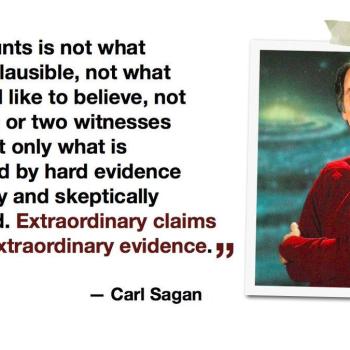In my class on the Bible we recently covered the story of the Exodus. Just before we reached that point, I noticed a mention of a new documentary, which seemed to be recycling old ideas, called Patterns of Evidence: Exodus, which in turn is based on the book Exodus Myth or History? by David Rohl
. I am happy to say that Hector Avalos has looked at the claims of the documentary in detail and shared his criticisms online. The TL;DR version is that this is simply a rehashing of claims that have been addressed adequately before by scholars. The claim is that, if you move the Exodus back far enough in Egypt’s history, then you get a precise fit with certain evidence. That claim is simply false – while it may be that the Exodus story in the Bible incorporates elements that are from long before the time in which the Bible sets the narrative, that is a very different scenario than what these kinds of books and documentaries claim. You can find possible connections between the Exodus story and history. But there is no way at all that one can make it plausible that the Exodus as depicted in the Bible was a historical event. It simply makes no sense to have an enormous population depart from Egypt, its animals and crops decimated, and its army wiped out in the way the Bible depicts, without this leaving a clear trace in not just the literary record but also the economic and political life of Egypt and the nations around it. Egypt continues to be a major power to such an extent that, in our first mention of Israel in an inscription, the Egyptian pharaoh Merneptah could claim (with exaggeration, obviously) that he had utterly destroyed Israel.
The Exodus is, even from the perspective of historical maximalism, Israel’s equivalent of that claim by Merneptah. At the very best, it could represent a gross exaggeration that ultimately derives from some historical experience, perhaps of slaves gaining their freedom, whether they were located in Egypt proper or under its rule in Canaan. But there simply isn’t a way to make it seem plausible that the story of Exodus, as depicted in the Bible and taken at face value, is a factual account. Or at least, one cannot make this seem plausible unless one is willing to deal in a distorting and dishonest manner with the relevant evidence.
Click through to read Hector Avalos’ more detailed evaluation of and responses to the film’s claims, as well as his follow-up post responding to complaints about the first post from David Rohl. And see also my earlier post about the Exodus, in which I asked the following question:
Which is the greater miracle? Believing that God sent plagues and drowned soldiers? Or believing that God ensured that no one in Egypt made any mention of these occurrences and that no shred of tangible archaeological evidence would be left?


















